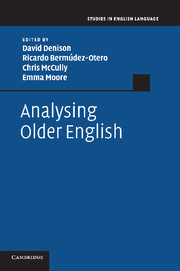Book contents
- Frontmatter
- Contents
- Figures and maps
- Tables
- Contributors
- General introduction
- Part I Metrics and onomastics in older English
- 1 Introduction to Part I
- 2 What explanatory metrics has to say about the history of English function words
- 3 to þære fulan flóde . óf þære fulan flode
- 4 Notes on some interfaces between place-name material and linguistic theory
- Part II Writing practices in older English
- Part III Dialects in older English
- Part IV Sound change in older English
- Part V Syntax in older English
- References
- Index
3 - to þære fulan flóde . óf þære fulan flode
on becoming a name in Easton and Winchester, Hampshire
Published online by Cambridge University Press: 05 December 2011
- Frontmatter
- Contents
- Figures and maps
- Tables
- Contributors
- General introduction
- Part I Metrics and onomastics in older English
- 1 Introduction to Part I
- 2 What explanatory metrics has to say about the history of English function words
- 3 to þære fulan flóde . óf þære fulan flode
- 4 Notes on some interfaces between place-name material and linguistic theory
- Part II Writing practices in older English
- Part III Dialects in older English
- Part IV Sound change in older English
- Part V Syntax in older English
- References
- Index
Summary
The legal transaction recorded in Latin in British Library, Additional MS 15350, fos 72v–73, is a grant by king Edgar to Byrthelm [Brihthelm], bishop of Winchester, of land at Easton, a village just north-east of Winchester and probably named because of that position. It is dated 961, exists only in a twelfth-century copy, and is judged authentic by Finberg (1964) and by Hart (1970). A set of bounds in Old English (OE) appears as an appendix to the document. These are discussed by Grundy (1924: 88–92). The whole is printed in Birch’s Cartularium Saxonicum (1885–99) as document 1076, and catalogued as no. 695 in Sawyer’s (1968) list of Anglo-Saxon charters.
Its interest in the present context lies in the two phrases in the boundary clauses quoted in the title. These are in good Old English, and mean ‘to the foul channel; from the foul channel’, though the feminine noun shows later OE attrition of the weak oblique case ending -an. This noun is discussed briefly by Gelling (1984: 22). Exactly what distinguished a flōde from other sorts of watercourse a thousand years ago might be debated (Grundy (1924: 88) glosses it as ‘intermittent stream’), but for present purposes all that is necessary is the recognition that it had a clearly identifiable meaning, for which the gloss ‘channel’ will serve. Its status as an active item of the English vocabulary of its region is confirmed by its appearance in other Hampshire charter bounds of a similar date in syntactically fully transparent expressions (e.g. on scyteres flodan in a Meon charter, Birch 1200, Sawyer 754 (anno 967), regarded as authentic, to cleara flode in Micheldever, Birch 596, Sawyer 360 (anno 900), regarded by most commentators as an early forgery). The special point of interest is that the expression in the Easton bounds is clearly the source of the name Fulflood, that of a district in the west of the city of Winchester. The expression in the bounds and the district name probably relate to each other in the following way: the Easton bounds run upstream along the river Itchen at the western end of the parish, north of Winnall, and the crucial boundary point must have been opposite where the foul channel in question descended from the western side of Winchester to flow into the Itchen. Accordingly, the mention of the Easton boundary point is taken by Gover (c. 1961: 13) to be the earliest attestation of the name Fulflood, and the correctness of this equation is taken for granted in what follows.
- Type
- Chapter
- Information
- Analysing Older English , pp. 28 - 34Publisher: Cambridge University PressPrint publication year: 2011

